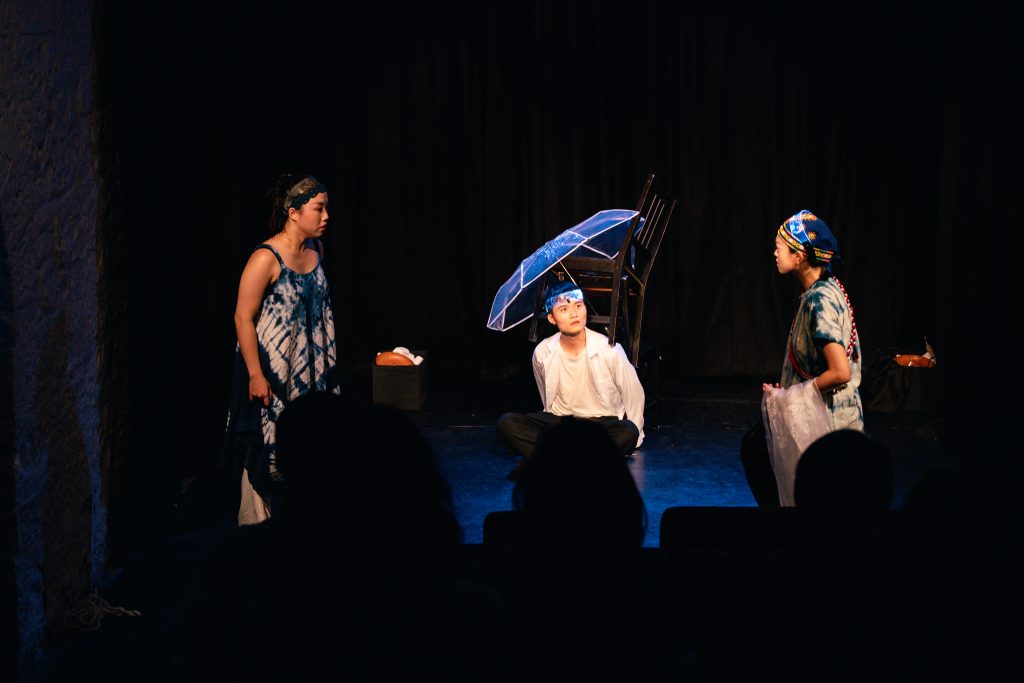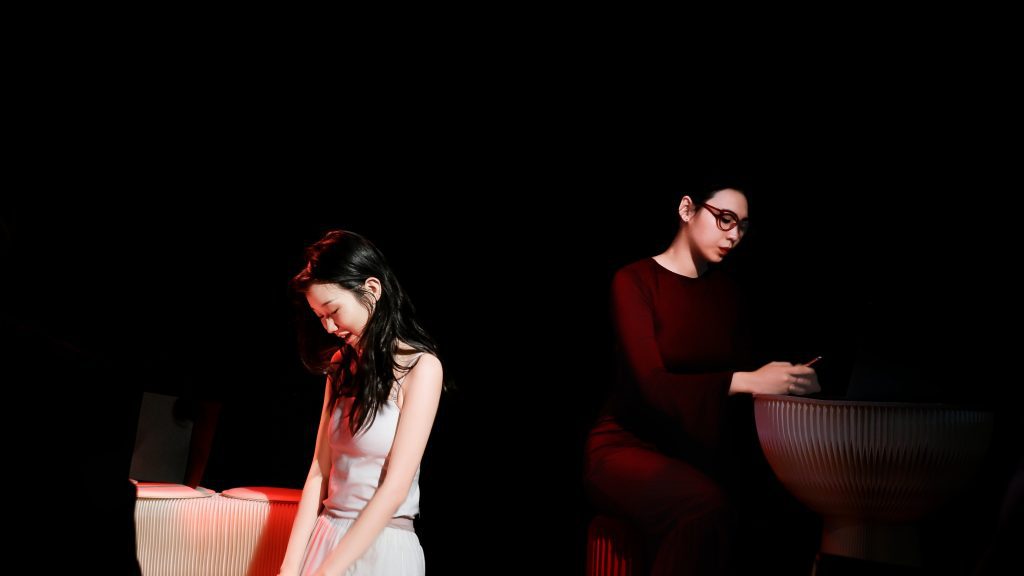Is there work on Mars
★★★★
In a Dystopian world, a young woman named Xue is being interviewed for a Move to Mars Worker’s Visa as a lawyer with Nylon Tusk’s SpaceX.
Through a series of tests and questions – all whilst doing a beep test – the audience are eyewitness to systemic barriers and biases that make her ineligible for a job she was qualified for and try to pigeonhole her into the STEM field based on Asian stereotyping.

While some of the questions may seem absurd, they aren’t too surreal for many who have emigrated as doctors, lawyers, teachers and other professions, only to be disqualified after immigration. And some of the questions can be found on actual visa applications – even tourist ones.
In montages in between the test, we learn about the external and internal pressures Xue has placed on her to fit in. From her youth as a neurodivergent student with dyscalculia in China, unable to fit in the role of the model student, to her cultural and social masking in university, and all the coping methods in between. She is candid in her storytelling, using deadpan humour to highlight these intersections of race, identity, culture and neurodivergence in a satire that dares you to look away.
Cleverly written and unflinchingly honest, Faye Yan delivers a tender, funny and profound one-woman show highly worth seeing.
Performed by Faye Yan, show runs until August 24.
Cardstock
★★★
BL – Boys’ Love – is a genre of erotic fiction with straight women primarily as their target audience. Originating from Japanese Manga, it has transcended cultures and media, but still at heart written for and by women.
Cardstock tells the story of two women: the writer, Mae, whose popular online BL serial is picked up by a traditional publisher, and the reader Lily, who has found solace in Mae’s work until an intimate scene between now opposite genders has her facing her own trauma head-on. The plot is simple and the stage is small, but it’s effectively utilised to narrate this tale between the reader and writer.
Through a series of skits, we witness Mae grappling with the decision to change her original work to achieve commercial success and follow domestic censorship laws. When she finally caves in, we see the subsequent chain reaction that causes Lily to spiral into her own trauma.
Both actresses were brilliant in conveying emotion and complexity in a short time. Xinyue Zhao as Lily delivered a raw and emotional performance as she told her story of sexual abuse and maternal neglect. Ching Chen as writer Mae was subtle, but as the plot progressed and she learns Lily’s story, her quiet resolution and strength are discernible in her every word.
A special note to the third character: Mae’s glasses. They had a personality of their own and could change the whole mood of a scene.
A poignant, tender and shrewdly written performance that begs the questions: What is the responsibility of the writer to the reader? And what is the role of a reader?
Written by Qianyue Ang, Directed by Xiaoyao Luo

The Urban Monk
★★★★
Grunts and grumbles can be heard on the darkened stage before the lights slowly illuminate a dancer squirming on a folding table from the demanding hands of a masseur who plays their patient’s vocal complaints like a xylophone.
Having taken inspiration from The Three Monks parable that places importance on cooperation and unity, the theme quickly becomes discernible when the scene shifts and the dancers move to 80s New Wave music. Individually, they are striking, but as a group they don’t feel harmonious as at least one dancer is out of sync and dancing to a seemingly different track.
Through a series of sequences, dancers move through elements of everyday life, multitasking and burning themselves out as they blindly follow to make a living, earn money and survive. Dancers chase connection, not with each other but with their phones and the instant gratification from viewing the world from a screen. Between all of this external stimulation and internal coping methods, the audience is rewarded with moments of cohesion when they come together to cooperate.
The choreographer and director have done an outstanding job personifying these complex themes, maximising impact on a simple set with capable dancers who move fluidly even in moments of fragmentation.
A tenacious and compelling performance full of symbolism that examines the absurdities and complexities of modern life and relationships.
Performed by Higher Link International Culture and Communication Ltd

The Time Painter
★★★★
A musician plays an accordion and leads the way into the venue, continuing to serenade the audience that fills the seats. Once everyone is in, he hands out paper cone cups and fills them with apple juice, asking the audience to drink it like wine – with all of our senses. Mine drips all over my hands, but several people around me come together like a community to help solve the problem.
While all this is happening, a woman in a janitorial uniform is cleaning the set. A long white table is set up in the middle of the stage, and she wipes it clean. The scene shifts, and a white piece of paper is placed over the table as a group of gossiping performers create a landscape on the paper. They pour water along the centre to create a river, use the cone cups as mountains, and cut out homes.
A child is born, Bokhee, and we watch her grow up under the love of her mother and the care of her community. The performers, set designer, lighting designer and sound designer all did an exceptional job of creating sentimentality and connection with each visceral element on set. So much so that when our Bokhee – because she feels like ours now – is killed during South Korea’s 1980 Gwangju Democratic Uprising, her mother’s grief is felt by each and every audience member. And we realise that we weren’t watching Bokhee grow up at all, we were viewing her mother’s memories of her.
So where does the apple juice come in? The musician told us to treat it like wine, meaning to draw from our memories for tasting notes of the sweet and rich fruit. And throughout the performance, an apple is used to create connection between mother and daughter, evoking memories of love and loss from the simple fruit.
The Time Painter is an achingly tender, evocative and sweetly funny show that reminds us that people are like a blank piece of paper – the future is ours to write and shape, influenced by internal and external circumstances while the remnants are left for others to interpret.
Performed by ACC, ACCF, Haddangse / Korean Season by GCC and AtoBiz, show runs until August 24

Whale, Where Are You Going
★★★★
An old man goes about his nightly routine, his bones creaking and groaning as he moves around a multitextured set. While he snores, two elves dressed as safari explorers unbox his things and make a puppet of a little boy. He comes to life, and upheaves the life of an old man well set in his routines.
Through puppetry, both physical and shadow, the grumpy old man slowly loosens from stiffness – both literally and figuratively – accumulated throughout his years to relive his memories and explore his dreams. The boy puppet flies on a plane through the audience as fluffy cotton clouds go by, and giant whales are projected nearly as large as life onto the walls around the audience.
The set design is full of inspiration, as there is so much to explore with the eyes. The long curtain behind the set transforms into a quilted canvas to illustrate the old man’s dreams and create dimension in storytelling. Sound is used to buoy this, with underwater noises and strong wind feeling visceral and real. At one point, there is a huge storm where the curtains fly open. As the elves shake them, we can feel the wind on our skin as the harsh sound of the windstorm plays on our senses.
A sensory show that uses sight, sound and texture to invoke wonder and magic, and reminds us that connection is transgenerational. A nonverbal delight for adults and children alike.
Performed by S. Production, runs until August 24

The Poetess
★★★★
You may have seen Olivia Dodd on social media, setting up her writer’s table in public spaces and writing poems for passers-by. So, just how had she come to be doing this?
The set is beautiful. A dark wood vintage writing desk sits in a corner, and a full-length mirror in the other. Old copies of books are scattered about, and lines from famous poets are torn and hung up on strings crisscrossed from wall to wall. Through this intimate show, we get to know Olivia and her connection to her late grandmother through poetry.
When her grandmother’s typewriter is delivered with a note philosophising rules of life to live by, Olivia – and the two performers dressed identically as her courage and self-doubt – flip through others’ words, desperate to create the perfect poem in her writer’s block. But what is she chasing perfection in: poetry or herself?
She uses the typewriter to create minute connections with strangers, helping them move through their own inner selves while ignoring her own. A few audience members were on the receiving end of this as Olivia wrote poems based on their lingering thoughts, and many were moved to tears. But as the storytelling progresses, Olivia is confronted by strangers and friends about her own inner self, and she finally voices what she has been hiding from.
Olivia’s story resonated with me in a way that I hadn’t expected – as someone who covers up grief with self-reliance instead of facing it; of being that friend who always listens but never shares; and of being able to face others but not ourselves. The Poetess felt like therapy, having given name to something heavy that has long sat with me and feeling lighter for recognising it.
Performed by Olivia Dodd, runs until August 25.

Photo credit: Molly Chou
Echoes of Ghost Lake
★★★
In the small, damp-smelling venue, a not-too-futuristic world is brought to life.
Musical actors start big with a catchy song that would not be amiss as an intro for a television series or film. The three actors have good delivery, harmonise well with each other, and their voices carry earnestly over the audience.
A young man working for a lab is sent to a remote island to collect water samples. He meets a young woman leaving an offering to a deity for rain, and through his carelessness and ignorance, ruins her altar. After a confrontation, he uses a futuristic translation device to communicate.
As their mutual mistrust slowly turns into a truce and they come to understand and appreciate each other’s perspectives, the audience is given hope that people respect each other despite their differences. But that tenuous friendship is put to the test when their different values leave their priorities in conflict.
Echoes of Ghost Lake serves a poignant message about colonialism and the clash between tradition and ever-growing technology. The musical actors did a phenomenal job transporting the audience to this world and immersing us in the tension between conflicting beliefs and newfound friendship.
Performed by NTNU GIPA

GENDAI
★★★★
Three white pieces of clothing are folded neatly at the back of the stage. A red light is projected like a string with their logo illuminated on the stage, while two purple lights crisscross each other like swords. A dry ice machine slowly fills the space until the entire stage is set in smoke. Two performers kneel parallel with symmetrical poses while another is centred between them.
When the show begins, the lasers aren’t the main draw, but enhance the performers’ skill and demonstrate their understanding of their own anatomy. They move like they can account for every muscle in their body, and it is breathtaking to watch.
When the lasers’ tempo increases and becomes more intricate, you can hear the collective gasps from the audience as the dancers move in and around the lasers with innovative manoeuvres, transforming lasers into character spotlights, swords, arrows and other inventions.
GENDAI delivers a captivating and fresh performance that transports the audience into a sci-fi film or video game. I highly recommend catching this 15-minute gem at Wu.
Performed by GENDAI/UMIBOZE/AKIRA – n o s productor co ltd, show runs three times a day until August 24.

The 11th Hour
★★★★
The performers stand robed in everyday outfits – a birthday hat, a sun hat and sundress, a bicycle helmet and spandex, a fur hat and suspenders – and move in succession to the beat of their lives lived. Slowly, that changes as they’re confronted by their mortality and grapple with their last moments of life before it’s too late – the 11th hour.
In the first act, Rachel Lum’s “Four” cleverly interprets the Chinese tongue twister Sì hé shí (四和十) and plays on the word sì (four), which sounds very close to the Mandarin word for death, sĭ. Unlike traditional superstitions that tend to avoid the word, “Four” seeks to embrace it with four performers who poignantly brought to life Lum’s choreography with rhythm and grace and defiance.
“Death to Duets” by British choreographer Sam Cohen shifts in tone and style but keeps the meaning. Moments throughout feel cinematic, similar to when a gangster film plays upbeat music during a massacre, only for the hollowness to follow in the aftermath.
Filled with dark humour and grim determination, this Dance of Death begins with a performer in a skull mask while everyone gravitates around them. There is a push a pull, their every action causing a reaction in the others as they beat death and death beats them. Dancers are masked and unmasked, as if telling the audience to unmask their fear of death until it comes full circle and everyone is masked in death.
The 11th Hour is a fervently creative double bill that tackles the inevitability of death with beauty, dexterity and humour.
As someone who has a heightened awareness of her mortality, this performance sung to my heart and had me looking at my own fears. A must-see before the Fringe ends.
Performed by Decadance Co Singapore, runs until August 24.
Read more Fringe Reviews here.
Subscribe to read the latest issue of Scottish Field.
TAGS


